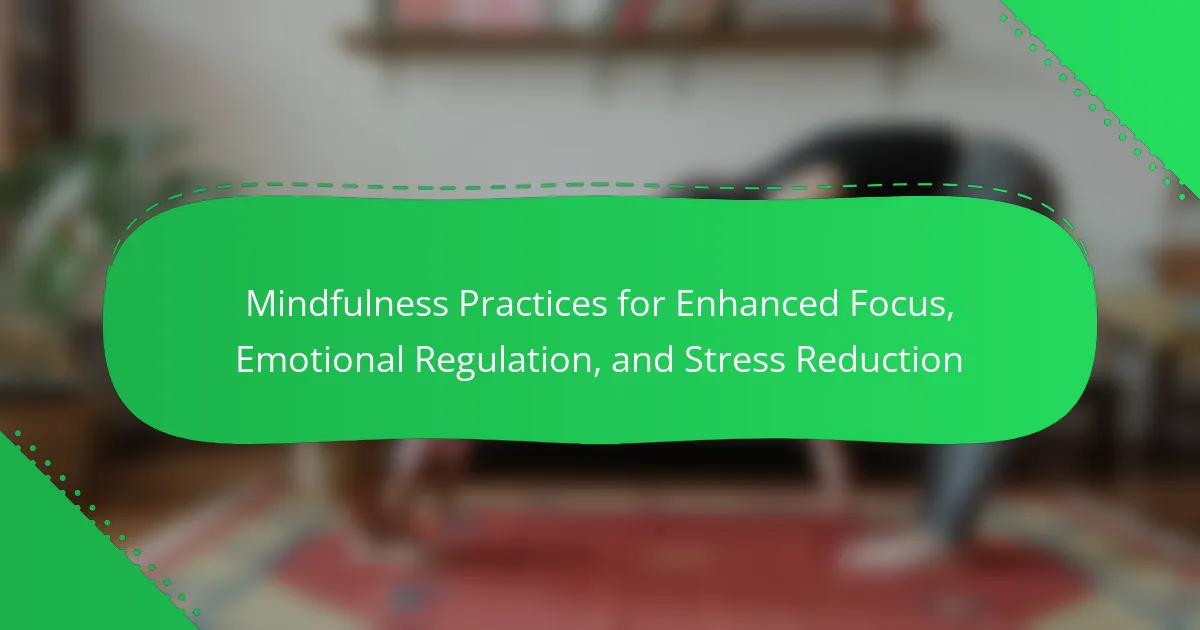Mindfulness practices enhance focus, emotional regulation, and stress reduction. Techniques like meditation and deep breathing improve attention span and manage emotions effectively. Regular engagement lowers stress levels and fosters mental clarity. Cultural perceptions shape these practices, influencing their effectiveness and outcomes.
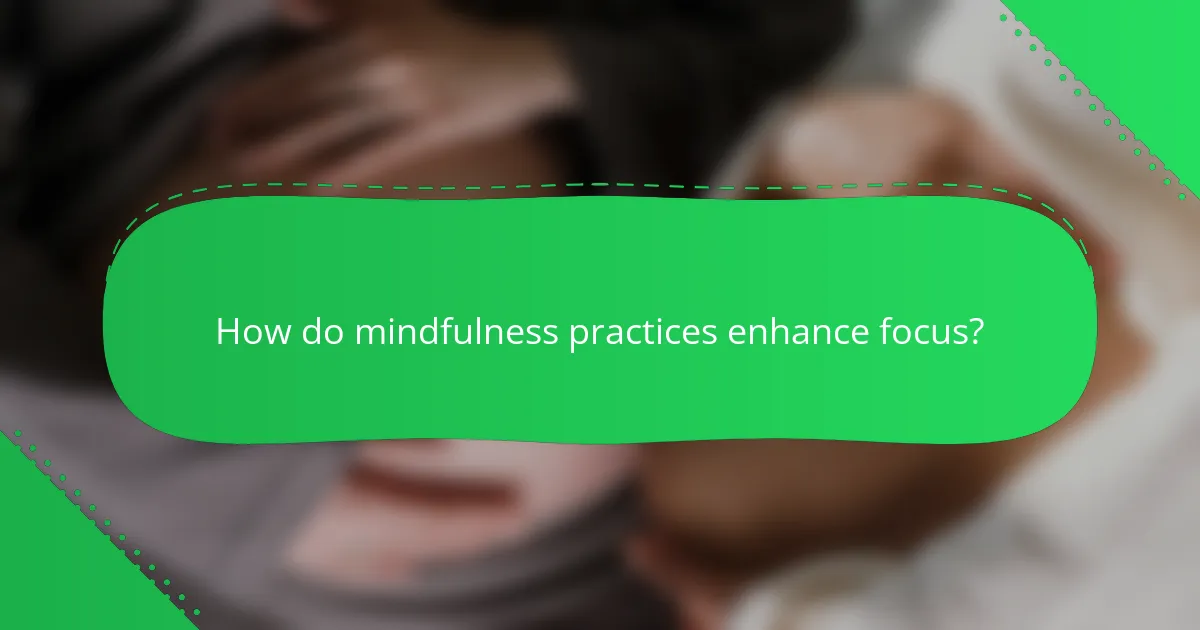
How do mindfulness practices enhance focus?
Mindfulness practices significantly enhance focus by training the mind to remain present. Techniques such as meditation and deep breathing improve attention span and reduce distractions. Research shows that consistent mindfulness practice can lead to a 20% increase in cognitive performance. This enhancement occurs as mindfulness fosters emotional regulation, allowing individuals to manage stress effectively, which in turn supports sustained concentration. Engaging in mindfulness also promotes a unique attribute: the ability to observe thoughts without judgment, further refining focus.
Which techniques are most effective for improving concentration?
Mindfulness practices are highly effective for improving concentration. Techniques such as meditation, deep breathing, and body scanning enhance focus, regulate emotions, and reduce stress. Regular meditation has been shown to increase attention span and cognitive flexibility. Deep breathing exercises can lower anxiety, allowing for clearer thinking. Body scanning promotes awareness of physical sensations, aiding in grounding and concentration. Incorporating these techniques into daily routines can lead to significant improvements in focus and mental clarity.
What role does breath awareness play in enhancing focus?
Breath awareness significantly enhances focus by anchoring attention in the present moment. This practice reduces distractions and cultivates mental clarity. Research shows that mindful breathing can lower stress levels, fostering emotional regulation. As a result, individuals experience improved concentration and productivity in various tasks.
How does regular practice influence cognitive function?
Regular practice significantly enhances cognitive function. Mindfulness practices improve focus, emotional regulation, and stress reduction through consistent engagement. Studies show that individuals practicing mindfulness exhibit better attention control and cognitive flexibility. For instance, a meta-analysis found that mindfulness training can lead to improvements in working memory and executive function. Regular sessions foster neuroplasticity, allowing the brain to adapt and optimize cognitive processes.
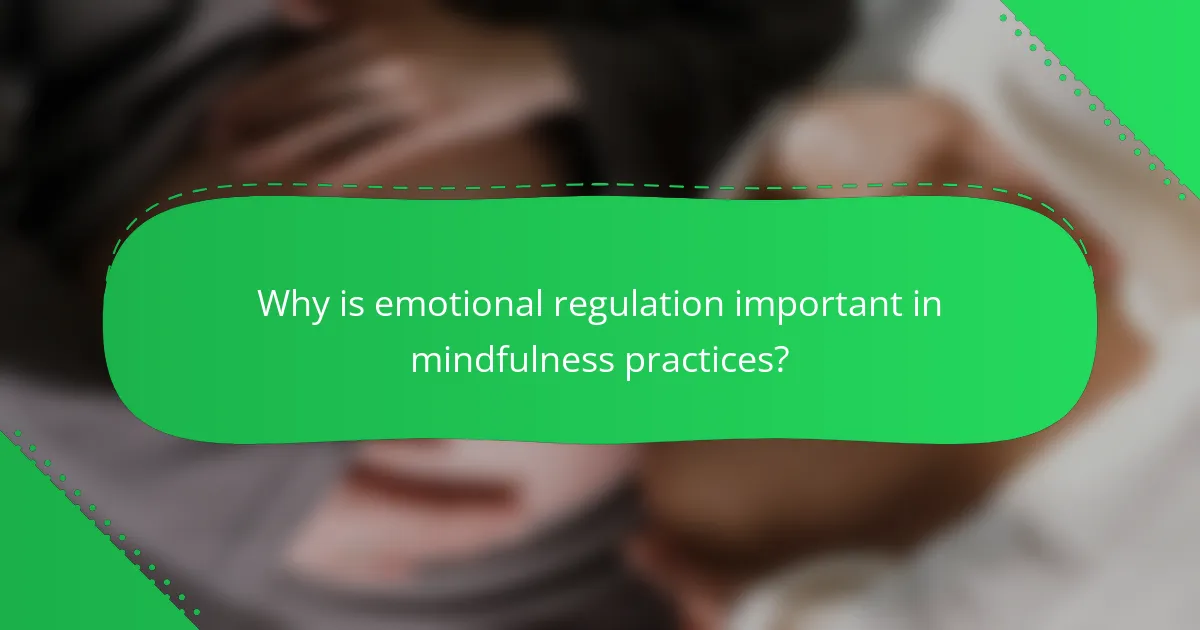
Why is emotional regulation important in mindfulness practices?
Emotional regulation is crucial in mindfulness practices as it enhances focus and reduces stress. By managing emotions effectively, individuals can maintain a clear mind, leading to improved decision-making and resilience. Mindfulness fosters awareness of emotional states, allowing practitioners to respond rather than react impulsively. This process cultivates a deeper connection to the present moment, promoting mental clarity and emotional balance. Research indicates that consistent mindfulness practice can lead to significant improvements in emotional regulation, ultimately enhancing overall well-being.
How can mindfulness help in managing emotional responses?
Mindfulness significantly enhances emotional regulation by promoting awareness of thoughts and feelings. This practice allows individuals to observe their emotional responses without judgment, leading to better management of stress. Research indicates that regular mindfulness practice reduces anxiety and improves overall emotional resilience. Techniques such as focused breathing and body scans foster a calm state, enabling more thoughtful responses to emotional triggers.
What are the benefits of emotional awareness through mindfulness?
Emotional awareness through mindfulness enhances self-regulation, reduces stress, and improves focus. By practicing mindfulness, individuals become more attuned to their emotions, allowing them to respond rather than react. This awareness fosters better decision-making and interpersonal relationships. Studies show that mindfulness can lead to a 30% reduction in stress levels, promoting overall well-being. Additionally, it supports emotional resilience, enabling individuals to navigate challenges more effectively.
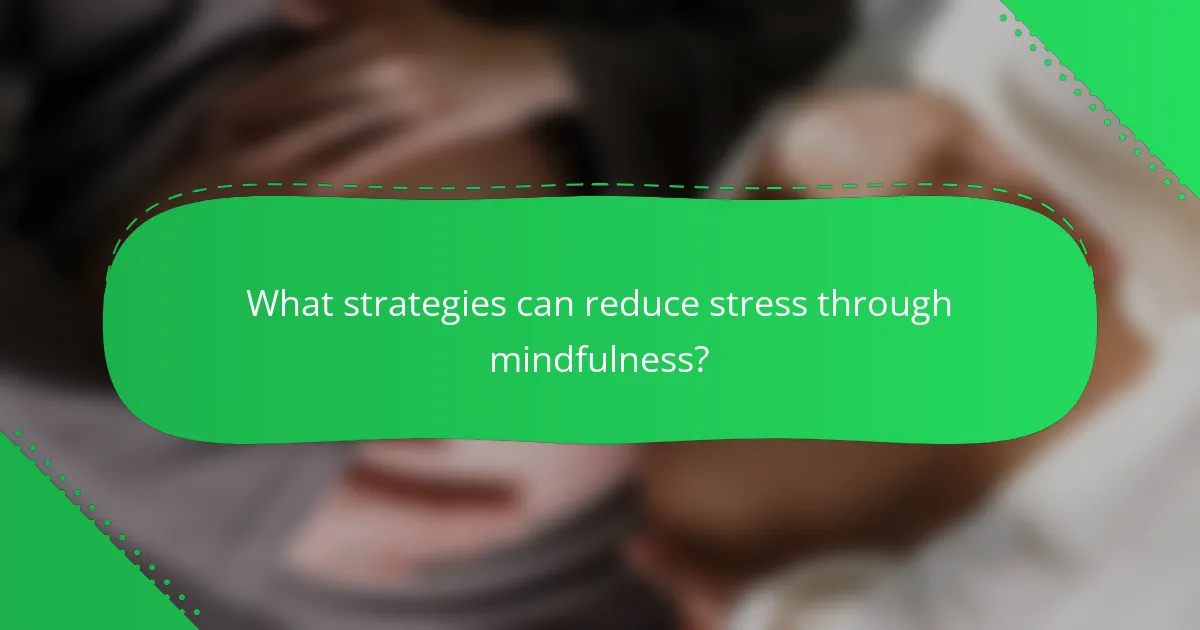
What strategies can reduce stress through mindfulness?
Mindfulness practices effectively reduce stress by enhancing focus and emotional regulation. Techniques such as meditation, deep breathing, and body scans promote relaxation and awareness. Regular engagement in these practices can lower cortisol levels and improve overall well-being. As a result, individuals experience better stress management and improved mental clarity.
How does mindfulness meditation impact stress levels?
Mindfulness meditation significantly reduces stress levels by promoting relaxation and emotional regulation. Research indicates that regular practice lowers cortisol, the stress hormone, enhancing overall well-being. Participants in studies report improved focus and resilience, contributing to better stress management. Techniques such as breath awareness and body scanning foster a sense of calm, enabling individuals to cope with daily pressures more effectively.
Which mindfulness practices are most effective for stress reduction?
Mindfulness practices such as meditation, deep breathing, and body scanning are highly effective for stress reduction. These techniques promote relaxation and enhance emotional regulation.
Meditation encourages focus and awareness, reducing anxiety levels. Deep breathing exercises help lower heart rate and improve oxygen flow, leading to calmness. Body scanning increases body awareness and releases tension.
Research shows that regular mindfulness practice can decrease stress by as much as 30%. This significant reduction highlights the importance of incorporating these practices into daily routines for better mental health.
Incorporating these techniques can lead to improved focus and emotional balance, making mindfulness a valuable tool for managing stress effectively.
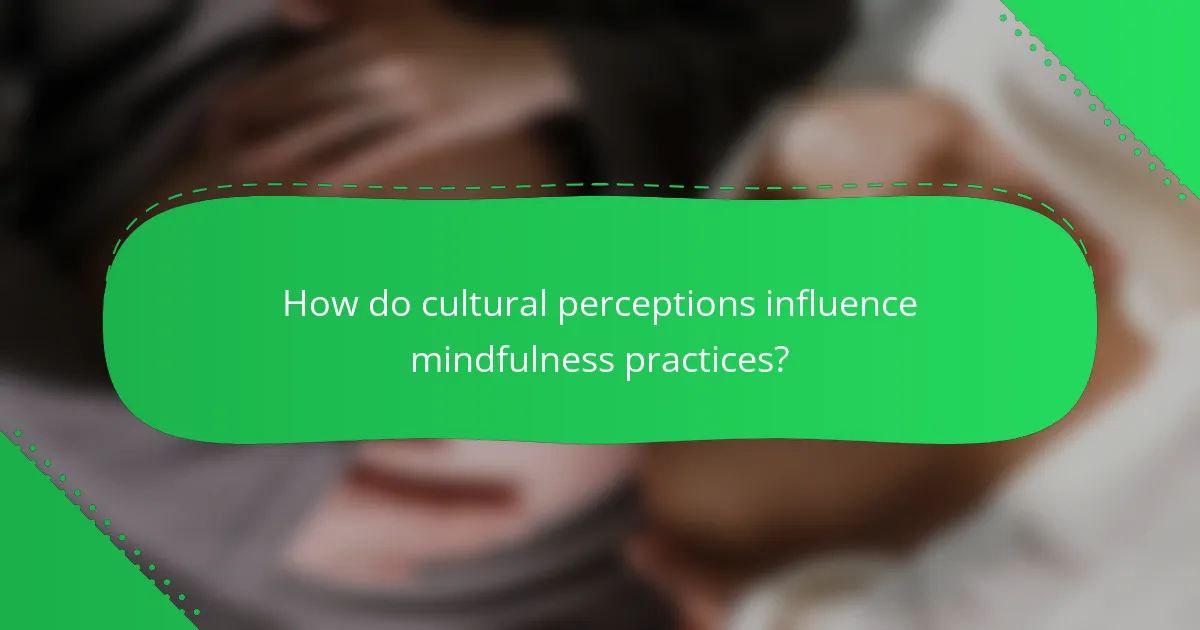
How do cultural perceptions influence mindfulness practices?
Cultural perceptions significantly shape mindfulness practices, influencing techniques and outcomes. Different cultures emphasize various aspects of mindfulness, such as community, spirituality, or individualism. For instance, Eastern traditions often integrate mindfulness with meditation and holistic health, while Western approaches may focus on cognitive behavioral techniques. These variations can affect practitioners’ focus, emotional regulation, and stress reduction strategies. Additionally, cultural narratives around mental health can either promote or hinder the adoption of mindfulness, highlighting the importance of context in practice.
What are the regional variations in mindfulness techniques?
Mindfulness techniques vary significantly across regions, reflecting cultural values and practices. In Asia, mindfulness often integrates meditation and breathwork, emphasizing spiritual growth. Western practices tend to focus on cognitive behavioral techniques and stress management. Indigenous cultures may incorporate nature-based mindfulness, connecting with the environment. Each approach enhances focus, emotional regulation, and stress reduction uniquely, catering to local needs.
How is mindfulness integrated into traditional practices in different cultures?
Mindfulness integrates into traditional practices across cultures by enhancing focus, emotional regulation, and stress reduction. In Buddhism, mindfulness meditation emphasizes awareness and presence, promoting mental clarity. In Hinduism, practices like yoga incorporate mindfulness for spiritual growth and emotional balance. Native American traditions often use rituals and nature immersion to foster mindfulness and connection to the present. In Japanese culture, practices such as Zen meditation focus on simplicity and attention to detail, enhancing mindfulness in daily life. Each tradition adapts mindfulness to its unique beliefs, showcasing its universal benefits.
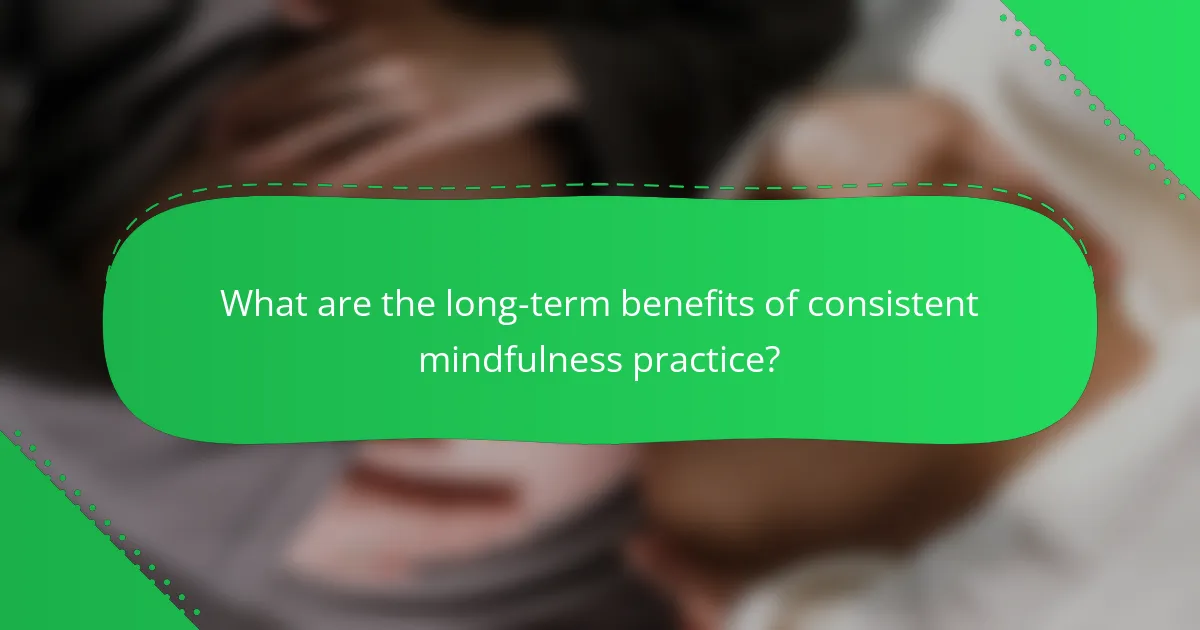
What are the long-term benefits of consistent mindfulness practice?
Consistent mindfulness practice offers long-term benefits such as improved focus, enhanced emotional regulation, and effective stress reduction. These benefits contribute to overall mental well-being and resilience. Research indicates that regular mindfulness can lead to structural changes in the brain, particularly in areas related to attention and emotional control. Additionally, practitioners often report lower levels of anxiety and depression, which further supports mental health. The cumulative effects of these practices can significantly enhance quality of life and personal productivity over time.
How does mindfulness contribute to overall well-being?
Mindfulness significantly enhances overall well-being by improving focus, emotional regulation, and reducing stress. These practices foster a state of awareness that helps individuals manage their thoughts and feelings effectively. Research indicates that regular mindfulness practice can lead to lower levels of cortisol, the stress hormone, promoting relaxation and resilience. Additionally, mindfulness enhances cognitive function, allowing for better concentration and decision-making. It also cultivates emotional intelligence, enabling individuals to respond to challenges with greater clarity and composure. Overall, mindfulness serves as a powerful tool for achieving a balanced and fulfilling life.
What evidence supports the effectiveness of mindfulness practices?
Research shows mindfulness practices effectively enhance focus, emotional regulation, and stress reduction. Studies indicate that regular mindfulness meditation can improve attention span and cognitive flexibility. A meta-analysis found mindfulness interventions significantly reduce anxiety and depression symptoms, promoting emotional stability. Additionally, neuroimaging studies reveal changes in brain areas associated with stress response, suggesting mindfulness alters neural pathways, enhancing resilience. These findings collectively support the effectiveness of mindfulness practices in fostering mental well-being.
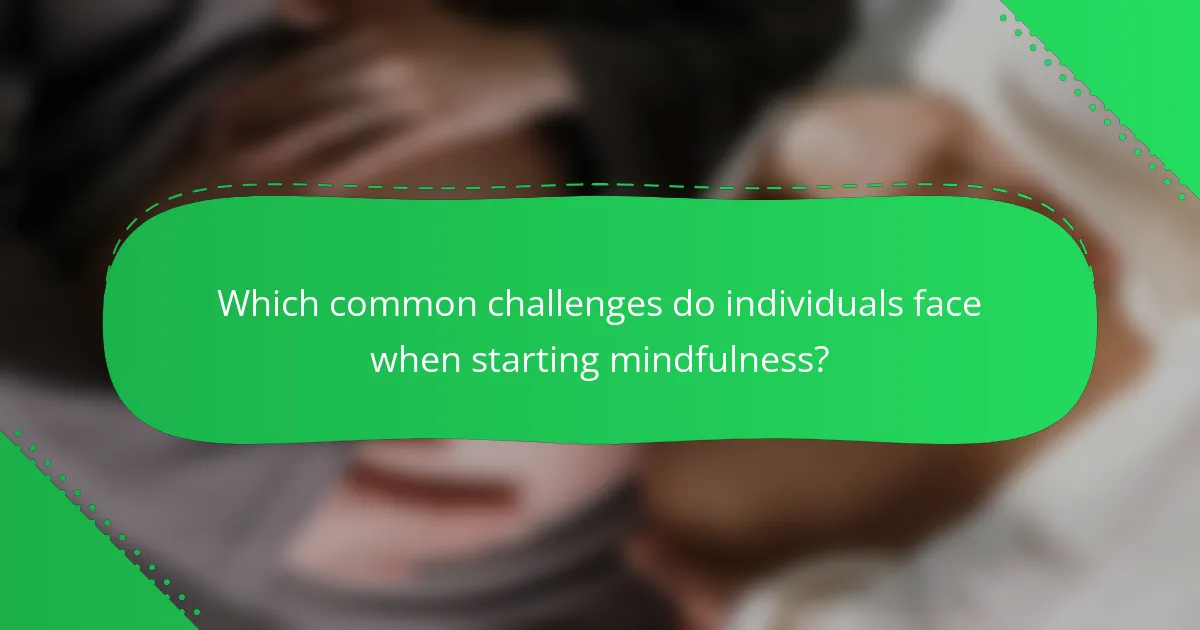
Which common challenges do individuals face when starting mindfulness?
Individuals often face challenges like difficulty maintaining focus, managing expectations, and dealing with emotional discomfort when starting mindfulness. These obstacles can hinder the effectiveness of mindfulness practices aimed at enhancing focus, emotional regulation, and stress reduction. Common issues include distractions from the mind, impatience with progress, and resistance to uncomfortable feelings that arise during practice. Developing a consistent routine and setting realistic goals can help overcome these challenges.
How can beginners overcome obstacles in mindfulness practice?
Beginners can overcome obstacles in mindfulness practice by establishing a consistent routine, focusing on the breath, and being patient with themselves. Setting aside specific times for practice helps build habit. Concentrating on breath anchors attention, reducing distractions. Understanding that challenges are part of the learning process fosters resilience and encourages continued effort.
What are the most frequent misconceptions about mindfulness?
Many misconceptions about mindfulness hinder its practice and benefits. Commonly, people believe mindfulness is solely about relaxation, when it actually enhances focus and emotional regulation. Another misconception is that mindfulness requires emptying the mind; instead, it involves observing thoughts without judgment. Some think mindfulness is a quick fix, while it actually requires consistent practice for lasting effects. Lastly, some assume mindfulness is only for those with mental health issues, but it can benefit anyone seeking to reduce stress and improve overall well-being.
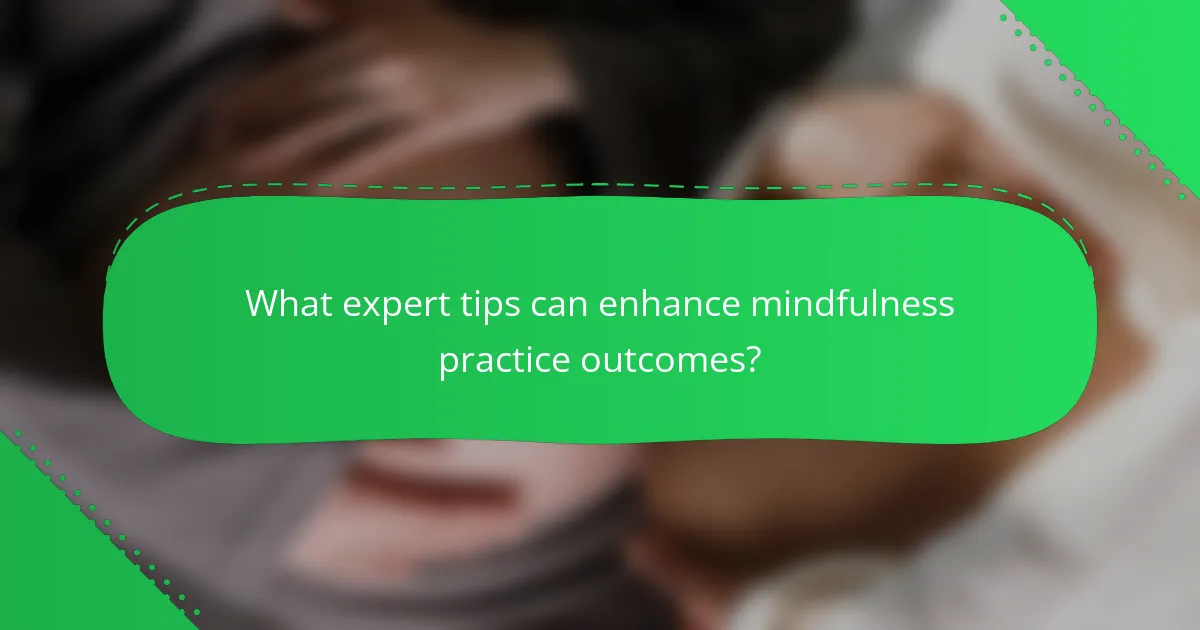
What expert tips can enhance mindfulness practice outcomes?
To enhance mindfulness practice outcomes, focus on consistency, technique variety, and self-reflection. Regular practice, even for short durations, builds familiarity and effectiveness. Incorporating diverse techniques, like breathing exercises and body scans, keeps the practice engaging. Self-reflection after sessions helps identify personal growth and areas for improvement.
How can individuals create a supportive environment for mindfulness?
Individuals can create a supportive environment for mindfulness by fostering a calm, distraction-free space. This includes setting aside dedicated time for practice, minimizing noise, and incorporating natural elements like plants. Utilizing comfortable seating enhances focus and emotional regulation. Encouraging open communication about mindfulness practices builds community support, reinforcing the commitment to stress reduction. Regular group sessions or mindfulness workshops can further strengthen this environment, providing accountability and shared experiences.
What common mistakes should be avoided in mindfulness practices?
Common mistakes in mindfulness practices include distractions, unrealistic expectations, neglecting consistency, and improper posture. These errors can hinder focus and emotional regulation. Practicing mindfulness requires patience and dedication to yield benefits like stress reduction and improved mental clarity. Avoiding these mistakes enhances overall effectiveness.
